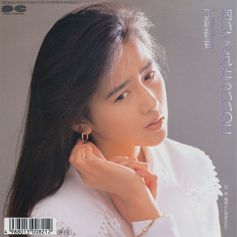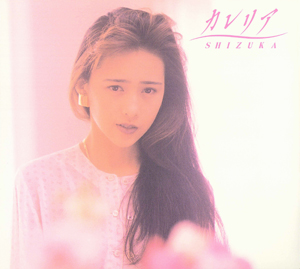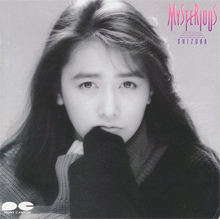
"Again" is a song recorded by Japanese singer Shizuka Kudo for her debut solo studio album, Mysterious. Pony Canyon released the track as the second single from Mysterious on December 2, 1987, in both 12-inch vinyl and maxi single format.

"Daite Kuretara Ii no ni" is a song recorded by Japanese singer Shizuka Kudo. The song was released as a single by Pony Canyon on March 2, 1988. Despite being included in several subsequent compilation albums, "Daite Kuretara Ii no ni" was never included in any studio album. An English version of the song was recorded for Kudo's 1998 ballad compilation album Best of Ballade: Current, on which it is dubbed "Let Me Sleep In Your Arms".

"Watashi ni Tsuite" is a song recorded by Japanese singer Shizuka Kudo. It was released as a single by Pony Canyon on September 21, 1990. The song made its first album appearance on the compilation album Unlimited, released that same year.
"Metamorphose" is a song recorded by Japanese singer Shizuka Kudo. It is the theme song for the CX television series Nandara Mandara, which starred Kudo herself. It was released as a single through Pony Canyon on October 23, 1991. "Metamorphose" made its first album appearance on the compilation album, Intimate. Kudo performed the song on her fourth appearance on Kōhaku Uta Gassen. In 2015, DAM asked their users to select their favorite Shizuka Kudo songs to sing karaoke to and compiled a top ten list; "Metamorphose" was one of the top vote-getters, rounding up the list at number ten.

"Koe o Kikasete" is a song recorded by Japanese singer Shizuka Kudo. It was released as a single through Pony Canyon on August 21, 1992. The song was featured on the AX television series Kyōshi Natsuyasumi Monogatari. It made its first album appearance on the compilation album, Best of Ballade: Empathy, released later that same year.

"Kirara" is a song recorded by Japanese singer Shizuka Kudo. It was released as a single by Pony Canyon on July 17, 1998. Both "Kirara" and its coupling song, "In the Sky", were prominently featured on the CX television series, Kamisama, Mō Sukoshi Dake. Kudo performed the song on the 49th Kōhaku Uta Gassen, accompanied by Taro Hakase on the violin, marking her eighth and last appearance on the show. "Kirara" made its first album appearance on the compilation album, Best of Ballade: Current, for which Kudo also recorded an English version of "In the Sky".

Rin is the seventeenth studio album by Japanese singer Shizuka Kudo. It was released a day shy of Kudo's 30th anniversary, on August 30, 2017, through Pony Canyon. The album marks Kudo's first studio album in over twelve years and includes nine original songs written by Japanese singer-songwriters Koji Tamaki, Tak Matsumoto and Kaori Kishitani, among others. it also features various collaborations with veteran songwriters, including lyricist Gorō Matsui, a long-time collaborator of Kudo's, as well as with new talent, such as Niconico utaite Mafumafu, the singer-songwriter duo Yoshida Yamada and first-time songwriter and author Shizuka Ijūin, while Kudo serves as the album's executive producer.

Shizuka Kudo Best is the tenth compilation album by Japanese singer Shizuka Kudo. It was released on December 5, 2001, through Pony Canyon. The album is part of the label's greatest hits series My Kore!ction. It was later released digitally on July 1, 2012. An abridged version of the compilation, as per the My Kore!Lite series, was released on May 19, 2010. All sixteen songs were remastered digitally for the album. The My Kore!Lite edition was re-released on June 15, 2016 in Ultimate HQCD (UHQCD) format.

Shizuka Kudo 20th Anniversary the Best is the eleventh compilation album by Japanese singer Shizuka Kudo. It was released in celebration of Kudo's 20th anniversary since her solo debut on August 29, 2007, through Pony Canyon. The compilation includes a selection of Kudo's singles released up until "Amayo no Tsuki ni". The limited edition comes with a DVD featuring the music videos for "Lotus ", "Kokoro no Chikara", "Clāvis (Kagi)" and "Amayo no Tsuki ni", as well as a digest of Kudo's live performances. Shizuka Kudo 20th Anniversary the Best was the first of three releases to celebrate Kudo's 20th, it was followed by the video album box set Shizuka Kudo The Live DVD Complete Box in September 2007, and the B-side compilation, "20th Anniversary B-side collection" in 2008.

20th Anniversary B-side collection is the twelfth compilation album by Japanese singer Shizuka Kudo. It was released in honor of Kudo's 20th anniversary on March 5, 2008, through Pony Canyon.

My Precious: Shizuka Sings Songs of Miyuki is the second cover album by Japanese singer Shizuka Kudo. It was released on August 20, 2008, through Pony Canyon. The album features eleven covers of songs originally penned and performed by Miyuki Nakajima, chosen by Kudo from Nakajima's exhaustive catalog. The record also includes, as bonus tracks, three songs of Kudo's that were written and composed by Nakajima: "Gekijō" (1996), "Setsu Getsu Ka" (1998) and "Clāvis (Kagi)" (2006).

Millennium Best is the ninth compilation album by Japanese singer Shizuka Kudo. It was released on March 15, 2000, through Pony Canyon. It is Kudo's second single collection: the album features all of Kudo's singles released from "Kindan no Telepathy" (1987) up to her most recent at the time, "Blue Zone" (1999), as well as all five singles released by Ushirogami Hikaretai. The album was released digitally on May 28, 2014, however only the four singles missing from the subsequently released compilation Shizuka Kudo Best were made available for download.

Best of Ballade: Empathy is the fifth compilation album by Japanese singer Shizuka Kudo. It was released on November 20, 1992, through Pony Canyon. It is Kudo's first ballad collection, followed by Best of Ballade: Current in 1998. Half of the album is made up of ballads from previously released studio albums while the other half features new songs recorded for the album as well as unreleased ballads co-written by Kudo, under the pseudonym Aeri.

Trinity is the seventh studio album by Japanese singer Shizuka Kudo. It was released on March 18, 1992, through Pony Canyon. Trinity is Kudo's last album to be produced by Tsugutoshi Gotō. It yielded Kudo the single, "Mechakucha ni Naite Shimaitai", which became one of Kudo's signature ballads. The album also includes one of Kudo's longest recorded songs, the album closer "Suterareta Neko Janai Kara", which runs for over seven minutes.

Harvest is the second compilation album by Japanese singer Shizuka Kudo. It was released on December 6, 1989, through Pony Canyon, merely two months after the release of the album Karelia. Harvest features the singles "Koi Hitoyo", "Arashi no Sugao" and "Kōsa ni Fukarete", their B-sides, a few select tracks from Kudo's three studio albums released at the time, Mysterious, Shizuka and Joy, as well as a new song recorded and co-written by Kudo for the album.

Gradation is the first compilation album by Japanese singer Shizuka Kudo. It was released on November 30, 1988, through Pony Canyon. The album includes all five singles released by Kudo at the time, from "Kindan no Telepathy" through "Mugon... Iroppoi", their coupling songs, as well as one new song, entitled "X'mas ga Ippai", recorded specifically for the compilation. Gradation was re-released in gold CD format on March 21, 1989.

Karelia is the fourth studio album by Japanese singer Shizuka Kudo. It was released on October 4, 1989, through Pony Canyon. It is a concept album inspired by the music from Finnish Karelia. The album was entirely recorded in Finland and features the Helsinki Philharmonic Orchestra as well as a choir group from the University of Helsinki. Despite being composed and produced by Tsugutoshi Gotō, Karelia lacks any trace of the signature rock style of Gotō's other compositions. The record features lyrics penned by Taeko Onuki and also includes the first song written by Kudo herself, under the pseudonym Aeri. While in Finland, Kudo created oil paintings inspired by the people and landscapes, which were incorporated into the design of the album's packaging. Karelia was re-issued in APO-CD format on December 1, 1993.

Joy is the third studio album by Japanese singer Shizuka Kudo. It was released on March 15, 1989, through Pony Canyon. It is the first of three albums released by Kudo that year: it was followed by the concept album Karelia in October and the compilation album Harvest in December. A limited first pressing of Joy was released in gold CD format. Kudo has stated that Joy is one of her favorite albums she has recorded. Nanase Aikawa has also listed the album as a major influence behind her decision to pursue a musical career. Joy was re-issued in APO-CD format on December 1, 1993.

Shizuka is the second studio album by Japanese singer Shizuka Kudo. It was released on July 21, 1988, through Pony Canyon. The eponymous record is often cited as an EP, despite being officially regarded as her second album. Shizuka is entirely written and composed by Miyuki Nakajima and Tsugutoshi Gotō, respectively. Nakajima recorded a cover of the fifth track, "Hadashi no Lion", for her album Otogibanashi: Fairy Ring (2002). Shizuka was re-issued in gold CD on March 21, 1989, and later in APO-CD format on December 1, 1993.

Mysterious is the debut studio album by Japanese singer Shizuka Kudo. It was released on January 21, 1988, through Pony Canyon. Mysterious was re-issued in gold CD on March 21, 1991, and later in APO-CD format on December 1, 1995.



















